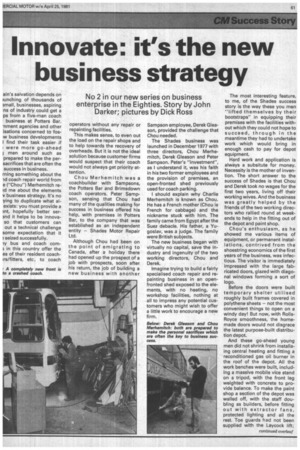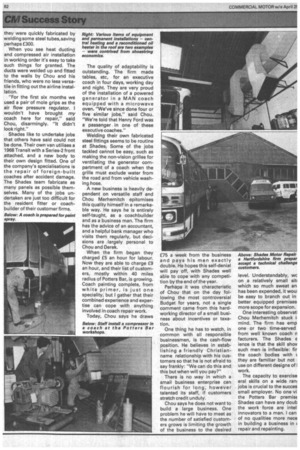Innovate: it's the new business strategy
Page 65

Page 66

If you've noticed an error in this article please click here to report it so we can fix it.
No 2 in our new series on business enterprise in the Eighties. Story by John Darker; pictures by Dick Ross
ain's salvation depends on lunching of thousands of 3mall, businesses, aspiring ns of industry could get a ps from a five-man coach
business at Potters Bar. -nment agencies and other isations concerned to fosw business developments I find their task easier if
were more go-ahead ; men around such as prepared to make the persacrifices that are often the success in business.
rning something about the ld coach repair world from e ("Chou") Merhemitch re;c1 me about the elements v business strategy. It's no ying to duplicate what alexists: you must provide a ?nt, hopefully better ser3nd it helps to be innovaso that customers can out a technical challenge some expectation that it seized successfully.
ly bus and coach corn3 in this country offer the es of their resident coach1-s/fitters, etc, to coach
operators without any repair or repainting facilities.
This makes sense, to even out the load on the repair shops and to help towards the recovery of overheads. But it is not the ideal solution because customer firms would suspect that their coach would not always get priority attention.
Chou Merhemitch was a coachbuilder with Sampsons, the Potters Bar and Brimsdown coach operators. Peter Sampson, sensing that Chou had many of the qualities making for success in business offered his help, with premises in Potters Bar, to the company that was established as an independent entity — Shades Motor Repair Ltd.
Although Chou had been on the point of emigrating to Canada, after a holiday there had opened up the prospect of a job with prospects, soon after his return, the job of building a new business with another Sampson employee, Derek Gleason, provided the challenge that Chou needed.
The Shades business was launched in December 1977 with three directors, Chou Merhemitch, Derek Gleason and Peter Sampson. Peter's "investment", as I understand it, was his faith in his two former employees and the provision of premises, an open-fronted shed previously used for coach parking.
I should explain why Charlie Merhemitch is known as Chou. He has a French mother (Chou is French for cabbage) and the nickname stuck with him. The family came from Egypt after the Suez debacle. His father, a Yugoslav, was a judge. The family were British subjects.
The new business began with virtually no capital, save the industry and ingenuity of the two working directors, Chou and Derek. • Imagine trying to build a fairly specialised coach repair and repainting business in an openfronted shed exposed to the elements, with no heating, no workshop facilities, nothing at all to impress any potential customers who might wish to offer a little work to encourage a new firm.
Below: Derek Gleason and Chou Merhemitch: both are prepared to make the personal sacrifices which are often the key to business success. The most interesting feature, to me, of the Shades success story is the way these you men "lifted themselves by their bootstraps" in equipping their premises with the facilities without which they could not hope to succeed, through in the meantime they had to undertake work which would bring in enough cash to pay for depot equipment.
Hard work and application is always a subsitute for money. Necessity is the mother of invention. The short answer to the success of Shades is that Chou and Derek took no wages for the first two years, living off their working wives. And the business was greatly helped by the friends of the two working directors who rallied round at weekends to help in the fitting out of the depot and paint shop.
Chou's enthusiasm, as he showed me various items of equipment, or permanent installations, contrived from the shoestring economics of the first years of the business, was infectious. The visitor is immediately impressed with the large fabricated doors, glazed with diagonal windows forming a sort of logo.
Before the doors were built temporary shelter utilised roughly built frames covered in polythene sheets — not the most convenient things to open on a windy day! But now, with RollsRoyce smoothness, the homemade doors would not disgrace the latest purpose-built distribution depot.
And these go-ahead young men did not shrink from installaing central heating and fitting a reconditioned gas oil burner in the roof of the depot. All the work benches were built, including a massive mobile vice stand on a tripod, with the front leg weighted with concrete to provide balance. To make the paint shop a section of the depot was walled off, with the staff doubling as builders, before fitting out with extractor fans, protected lighting and all the rest. Toe guards had not been supplied with the Laycock lift; they were quickly fabricated by welding some steel tubes, saving perhaps £300.
When you see heat ducting and compressed air installation in working order it's easy to take such things for granted. The ducts were welded up and fitted to the walls by Chou and his friends, who were no less versatile in fitting out the airline installation.
"For the first six months we used a pair'of mole grips as the air flow pressure regulator. I wouldn't have brought my coach here for repair," said Chou, disarmingly. "It didn't look right."
Shades like to undertake jobs that others have said could not be done. Their own van utilises a 1968 Transit with a Series-2 front attached, and a new body to their own design fitted. One of the company's specialisations is the repair of foreign-built coaches after accident damage. The Shades team fabricate as many panels as possible themselves. Many of the jobs undertaken are just too difficult for the resident fitter or coachbuilder of their customer firms.
Below: A coach is prepared for paint spray. Right: Various items of equipment and permanent installations — central heating and a reconditioned oil heater in the roof are two examples — were contrived from shoestring economics.
The quality of adaptability is outstanding. The firm made tables, etc, for an executive coach in four days, working day and night. They are very proud of the installation of a powered generator in a MAN coach equipped with a microwave oven. "We've since done four or five similar jobs," said Chou. "We're told that Henry Ford was a passenger in one of these executive coaches."
Welding their own fabricated steel fittings seems to be routine at Shades. Some of the jobs tackled cannot be easy, such as making the non-vision grilles for ventilating the generator compartment of a coach when the grille must exclude water from the road and from vehicle washing hose.
A new business is heavily dependent on versatile staff and Chou Merhemitch epitomises this quality himself in a remarkable way. He says he is entirely self-taught, as a coachbuilder and as a business man. The firm has the advice of an accountant, and a helpful bank manager who visits them regularly, but decisions are largely personal to Chou and Derek.
When the firm began they charged £5 an hour for labour. Now they are able to charge E9 an hour, and their list of customers, mostly within 40 miles radius of Potters Bar, is growing. Coach painting complete, from white primer, is just one speciality, but I gather that their combined experience and expertise can cope with anything involved in coach repair work.
Today, Chou says he draws
Below: Staff install a compressor in a coach at the Potters Bar workshops.
£75 a week from the business and pays his men exactly double. He hopes this self-denial will pay off, with Shades well able to cope with any competition by the end of the year.
Perhaps it was characteristic of Chou that on the day following the most controversial Budget for years, not a single comment came from this hardworking director of a small business about incentives or taxation.
One thing he has to watch, in common with all responsible businessmen, is the cash-flow position. He believes in establishing a friendly Christianname relationship with his customers so that he is not afraid to say frankly: "We can do this and this but when will you pay?"
There is no way in which a small business enterprise can flourish for long, however talented its staff, if customers stretch credit unduly.
Chou says he does not want to build a large business. One problem he will have to meet as the number of satisfied customers grows is limiting the growth of the business to the desired
Above: Shades Motor Repair a Hertfordshire firm prepar accept a technical challenge customers.
level. Understandably, wc on a relatively small sib which so much sweat an has been expended, it woul be easy to branch out in better equipped premises more scope for expansion.
One interesting observati Chou Merhemitch stuck i mind. The firm has emp one or two time-served from well known coach n facturers. The Shades c ience is that the skill shov such men is inflexible: fir the coach bodies with they are familiar but not use on different designs of I work.
The capacity to exercise eral skills on a wide rant jobs is crucial to the succes small employer. No one vi the Potters Bar premisE Shades can have any doub the work force are intel innovators to a man. I can of no qualities more nece in building a business in ( repair and repainting.














































































































